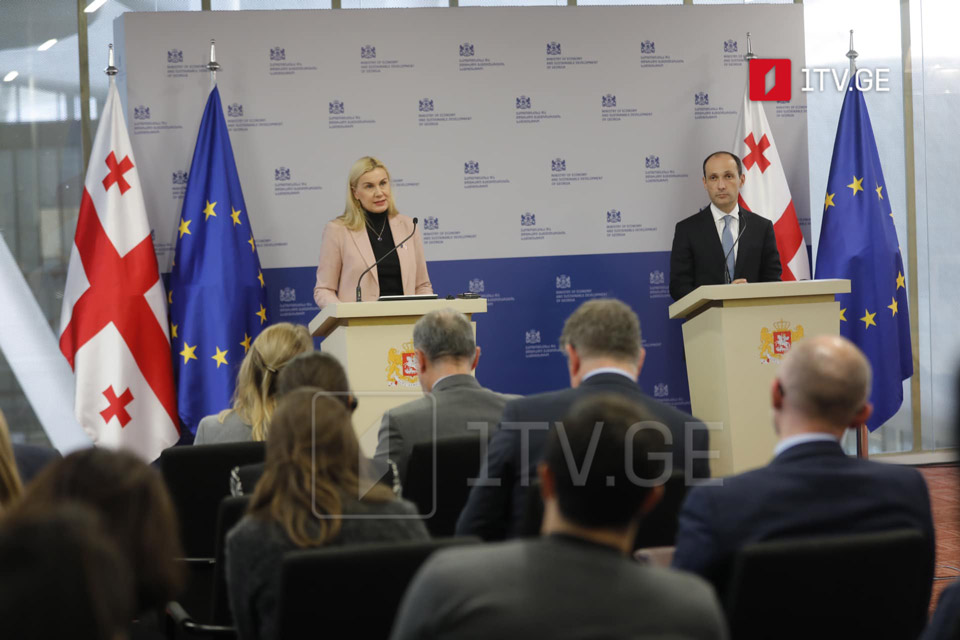
Kadri Simson, European Commissioner for Energy today on Thursday held the first meeting of the EU-Georgia high-level energy dialogue with Georgian Economy Minister Levan Davitashvili.
During the joint press point, Simson stated that “The European Commission fully supports the genuine aspiration of the Georgian people to be part of a free and democratic European Union. And the candidate status is a historical achievement for Georgia.”
“But it is also the beginning of a process. Georgia has taken a number of positive steps, which we have recognized, but still needs to make progress in all the 12 priorities identified last year. The basis of this progress will be determined by the Georgian government.
And in this light, today I discussed with the Minister, what are the issues still open in the energy sector, and what needs to be done to bring Georgia and the EU closer. We have discussed legislative reforms, investments, and key infrastructure projects, and I have stressed the importance of making progress in the regulatory framework in both the electricity and gas sectors.
This is not only a matter of convergence on the path to become a member of the European Union but these rules are necessary to make Georgia more energy secure and to attract more foreign investment to the country. They are also a precondition to link the national market with the European electricity market through an interconnection project. And there is some work to do. But we agreed that there are common understanding that we can deliver. I’m here to reaffirm that the EU will support Georgia in taking these steps with our technical but also financial assistance. And the European community will also be partnering in this process,” she asserted.
According to Kadri Simson, the meeting also covered the opportunities for fully exploiting Georgia’s potential when it comes to renewable energy. The duo also discussed prospects for investments in structure projects “because there is growing interest in this area too.”
“We agreed on several steps, and to keep the momentum. I proposed that Minister Davitashvili continue the dialogue on a regular basis and invited him to come to Brussels next year. Our meeting hopefully was first of the many, and it will enhance our bilateral cooperation and deepen coordination in strategic energy issues.
Indeed, as I was mentioning earlier, this is only the beginning of a journey and the end goal is to become a fully-fledged partner, a member of the European Union. That means that we will share some common values, but we will have the same legislation in place, and the same rules and we have to be prepared for some challenging situations because there are reforms that Georgia has to make.
I am responsible for the sector that actually plays a key role for the economy, for citizens, the security of the supply, but also the affordability of energy is a very important driver for the economy. And I truly believe that by aligning your legislation with the EU legislation you’re not only shortening the negotiations timeframe but you also bring benefits for your economy and for your citizens. And in this regard, these kinds of dialogues, like we initiated today, will help you in this process.
On top of that, this is not only about legislation but also about interconnections. I truly believe that this project that was launched a couple of years ago, the presence of our president, Ursula von der Leyen, that will connect European member states with Georgia by a subsea electricity cable, is also a flagship project that promotes renewables here in this region, but also adds some additional security to your region because this cable will be bidirectional and this is a key for both of us. Indeed, this Black Sea subsea electricity cable will integrate our electricity markets, and that means that we have to respect the same rules,” she went on.
European Commissioner for Energy stressed the importance of future investments into renewables, “because it makes sense to trade electricity all year around and despite the fact that hydropower plays such an important role here in the Georgian electricity market, it is a seasonal resource.”
“So future investments into wind and solar are necessary. I also invited the Minister to join our global pledge that will be signed after two weeks in COP 28. And that will address the global challenge.
We’ll prioritize energy efficiency and will also be pledged to triple globally the renewables. From the European Commission’s perspective, we have already managed to mobilize considerable investments under the economic and investment plan in Georgia. Approximately 1.8 billion Euros so far, of which 126 million are for the energy sector, so this includes investments in electricity interconnections, and the upcoming 2023 annual package for 85 million is planned to be adopted in November. And this will be key to advancing some of our flagship projects. Again, electricity interconnections are priorities right now,” she added.






